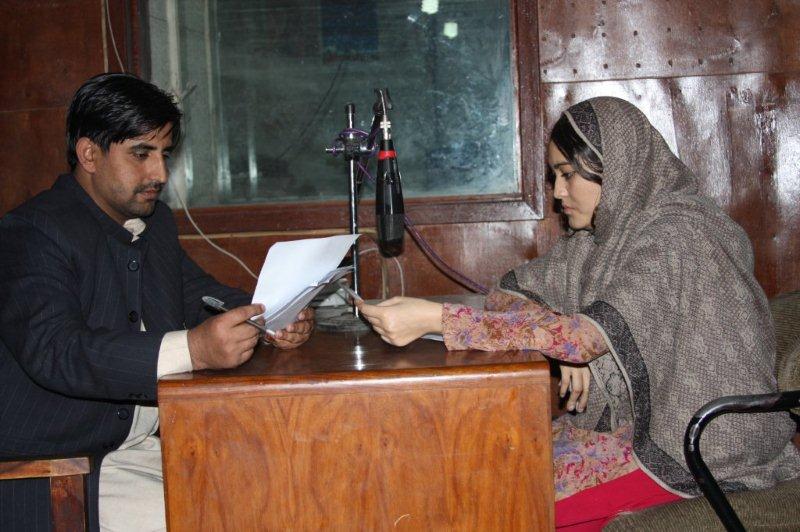KABUL - The World Radio Day was celebrated throughout Afghanistan with speeches, discussion and special radio programmes on 13 February. In the capital, Kabul, the event was held under the auspices of the Ministry of Information and Culture.
Zareen Anzoor, the Director of the national broadcaster RTA, read out the message of President Hamid Karzai, who called on radio stations to fulfill their responsibility by disseminating right information to the public, by promoting education, national unity and national interest.
Afghanistan’s Minister for Information and Culture, Sayed Makhdoom Raheen, said radio broadcasting started in Afghanistan 70 years ago. The first radio station was called Radio Kabul with limited coverage.
Minister Raheen said support of the Internews, BBC Radio and Radio Azadi was instrumental behind the radio boom in Afghanistan.
Afghanistan has made significant progress in the field of communications during the last 10 years. According to the Ministry of Information and Culture, over 160 radio stations and 60 television channels are operating in the country.
Afghanistan also registered significant progress in defending rights of journalists and promoting freedom of the press in 2012, an achievement hailed by both journalists and the Government of Afghanistan. In its World Press Freedom Index 2013 released on 30 January, the Reporters Without Borders (RSF), a Paris-based media rights watchdog, ranked Afghanistan 128th in its global index of 179 countries.
The UN General Assembly formally endorsed last month a proposal by the UNESCO to mark the World Radio Day on 13 February, the day United Nations Radio was established in 1946.
In his message, UN Secretary-General Ban Ki-moon said, “Since its invention more than 100 years ago, radio has sparked the imagination, opened doors for change, and served as a channel for life-saving information.” Many radio stations across the country broadcast Mr. Ban’s message.
Given the difficult terrain of Afghanistan, radio is the best form of mass media to reach out to the people.
UNAMA, in collaboration with the national broadcaster RTA, has a weekly radio show – “Afghanistan Today”. The UNAMA radio programme examines the latest UN development programmes in Afghanistan, touching on themes of current interest like environment, rule of law, public health, human rights, culture and voices of the Afghan communities.
Speaking at the 13 February event in Kabul, Ajmal Torman, the head of Arakozia Radio, said that despite growing number of Afghan households owning television sets radio had still kept its special position intact.
Shakib Sanin, a young journalist from Afghanistan’s eastern Kunar province who owns the Zala (shining) media group, told UNAMA over phone that giving more freedom to radio was civilization. Mr. Sanin said radios were more important than other forms of media in Afghanistan because “radio can be listened by everyone, everywhere even when people are working”.
“Women listen to radio while working at home. Even the visually impaired people and illiterate people can listen to it,” said Mr. Sanin, who set up Kunar’s first privately-run radio station in 2007.
To mark the Day, UNAMA field offices, in collaboration with local radio stations, facilitated a series of radio roundtable discussions and other programmes and interviews throughout the country, highlighting the important role radio can play in people’s lives.
In southeastern region, the Radio Day was marked in all four provinces (Paktya, Khost, Ghazni and Paktika) by organizing round-table discussions and talk shows, and by broadcasting special features.
Speaking in a radio-round discussion, organized by Khost Killid radio, journalist Mohammad Ilyas Wahdat cited a survey, which said 200,000 people listen to radio in Khost province alone. “No one can collect even 10,000 people for a particular programme. Only radio can reach out to thousands of people,” said Mr. Wahdat.
In eastern Nangarhar province, four radio stations had special programmes on the Radio Day. One of them was Radio Nargis, a special radio station for women and run by women. The Radio Nargis had one-hour live programme on the theme of the World Radio Day. Soon after the presenter read out the message of UN Secretary-General Ban more than 15 local girls, including one from Pakistan, called the radio station in the live phone-in show.
Many girls calling the radio station praised the role of radio in Afghanistan. One girl, Nasrin, from Kama district said “radios have brought many changes to our society”. Another caller, Sheeba from Jalalabad City, said her father sent her to school after listening to positive messages in the radio.
Local Safa Radio broadcast two special programmes – interviews of ordinary men and women in the street on the role of radio, and a 40-minute phone-in programme.
Radio Sharq and RTA had also broadcast special programmes, where journalists were interviewed, and the director of culture and information answered to telephone calls.
In northeastern Kunduz province, independently-run radio stations held one-hour live broadcast, taking calls from listeners and talking about the role of radio in raising public awareness and its impact on social development. Radio Zuhra and Radio Cheragh stations organized round-table discussion on the role of radio in developing a democratic society.
Similar programmes were held in Kandahar, Bamyan, Herat and Mazar-i-Sharif.
Brief history of radio in Afghanistan
Afghanistan had its first radio broadcast in 1927, during the period of King Amanullah, from Kabul. The radio station was located at Pul Hartal in Kabul. In 1941, Germany helped establish and equip a radio station in Pul Bagh Umumy, Kabul.
In 1949, the first radios that could work with a car battery were imported to the country. Only up to 10 people had such radios.
Engineer Amirudding Sunshab, one of the first Afghans who studied in Germany in the 1930s, wrote in his book that he was one of the first persons to have a radio and used it with the car battery.
(Compiled by UNAMA Kabul)






